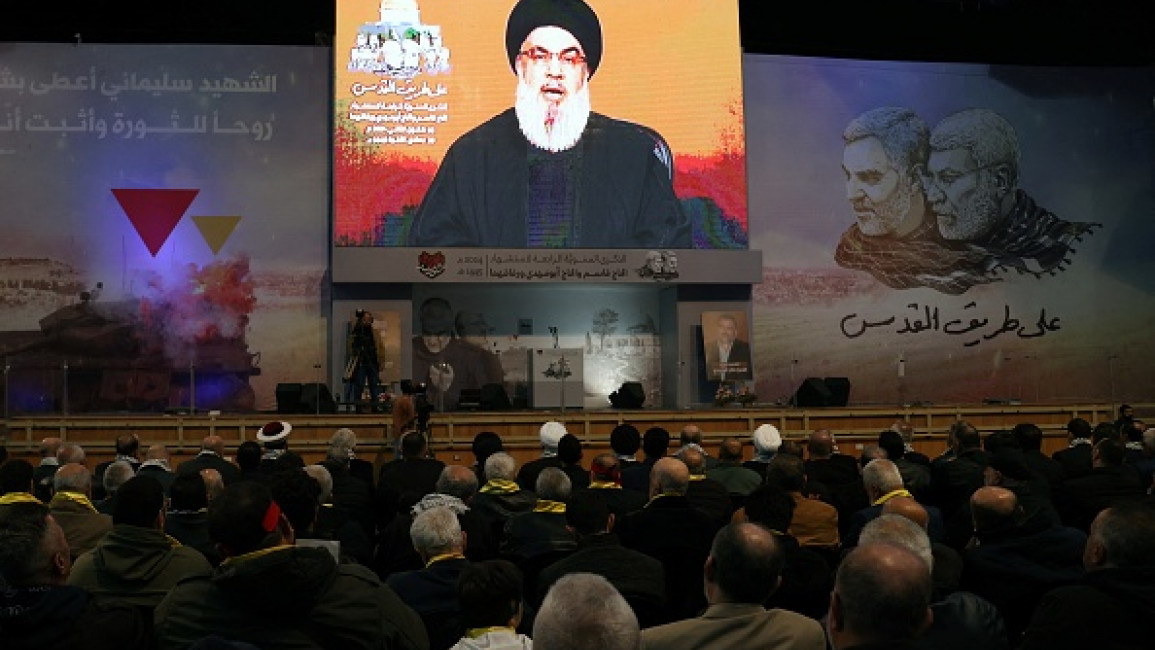Hezbollah chief Nasrallah warns 'boundless battle' if Israel starts war with Lebanon
The head of Hezbollah Hassan Nasrallah warned Israel not to start a war with Lebanon in a speech on Wednesday, saying war would "come at a very high cost".
Nasrallah stopped short of threatening to start an all-out war with Israel, but instead said that it is trying to take advantage of the current geopolitical situation to get rid of Hezbollah.
"If the enemy [Israel] considers waging a war against Lebanon, our battle will be boundless, without rules. If war is waged against Lebanon, Lebanon's interest will be to go to war all the way, unrestrained," Nasrallah said.
The Hezbollah leader's highly anticipated speech came the day after Israel assassinated top Hamas military commander Salah al-Arouri in Beirut, the first time Israel has struck Lebanon's capital city since the 2006 war.
Al-Arouri was the commander of Hamas's military wing and was key to managing the group's relationship with Hezbollah and Iran.
Analysts said that the assassination of the Hamas official was a significant escalation in the current tit-for-tat exchanges between Hezbollah and Israel, which until Tuesday, were limited to border regions.
Nasrallah promised that "yesterday's crime will not go unpunished," but did not specify how the group would respond to Israel's targeting of Arouri. He said that he would reveal further details in a second speech on Friday.
The Hezbollah head touted a long list of achievements by the Lebanese group throughout the speech, contrasting it with Israel's failure to dismantle Hamas and its assassination of individual military leaders.
"[Nasrallah] tried to escape this idea by saying how cowardly Israel is and how they are trying to fake symbolic victories by attacking individual leaders because they have not achieved any of their military objectives," Karim el-Mufti, a political science scholar at Sciences Po, told The New Arab.
Nasrallah also said that Hezbollah's weapons are the only thing preventing Israel from invading Lebanon, claiming that Israel is trying to exploit global support after Hamas's 7 October attack to attack Hezbollah.
He further dismissed the idea that the international community could protect Lebanon from Israel, saying the events in Gaza proved that international institutions are powerless to stop Israel.
Since November, Israel has demanded that Hezbollah withdraw to 30 kilometers north of the Lebanese-Israeli border and give up its weapons in compliance with UN Resolution 1701, which ended the 2006 war.
A farewell to the rules of engagement?
Nasrallah did not specify how the group would respond to Israel's assassination of al-Arouri, keeping the possibility of an escalatory response open.
Since 2006, the sporadic flare-ups between Israel and Hezbollah followed simple rules of engagement. Strikes were limited to border areas, generally incurring no casualties, and were one-off incidents that did not result in escalation between the two parties.
In the weeks following the 7 October attack, cross-border clashes remained within old rules of engagement, with attacks being contained within 2 kilometers of either side of the border. However, as rocket exchanges escalated, the old dictates of 'battle behaviour' between Hezbollah and Israel have fallen away.
"Israel and Hezbollah have generally pursued a new dynamic of tit-for-tat retaliation – that is, launching strikes against each other below the threshold of triggering an all-out war," David Wood, the Crisis Group Lebanon analyst, told TNA.
The eye-for-an-eye approach has gradually upped the ante between the two parties, as each gradually sought to increase its method of deterrence without escalating into an all-out war. The UN Peacekeeping mission in Lebanon – UNIFIL – has warned that this dynamic poses a serious risk of miscalculation which could spill over into a full-scale war.
Tuesday's strike on Lebanon's capital city was the furthest departure from the old rules of engagement and a significant escalation.
Conducting a drone strike hundreds of kilometers from the agreed-upon battlefield, in the first attack on Beirut since the 2006 war, is not only seen as an attack on Hezbollah but also on Lebanese sovereignty – of which Hezbollah has styled itself its protector.
Under the new rules of engagement, Tuesday's strike necessitates a response from Hezbollah that will satisfy its supporters and maintain its deterrence. It is unclear how far Hezbollah will go in its retaliation.
"It is clear that Hezbollah has taken consistent efforts to avoid a massive escalation over the past three months. It is very possible that Hezbollah will continue this pattern and avoid a response that could trigger all-out war," Wood said.


![President Pezeshkian has denounced Israel's attacks on Lebanon [Getty]](/sites/default/files/styles/image_684x385/public/2173482924.jpeg?h=a5f2f23a&itok=q3evVtko)



 Follow the Middle East's top stories in English at The New Arab on Google News
Follow the Middle East's top stories in English at The New Arab on Google News


